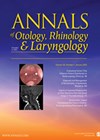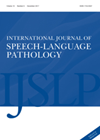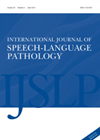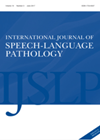
Journal Reviews
Strength of evidence in otolaryngology research – do women make the difference?
Clinicians around the world understand the need for research and publication of gathered evidence to inform practice and improve patient outcomes. The introduction of the Oxford Centre for Evidence-based Medicine (CEBM) Levels of Evidence guideline in 2011, has been invaluable...
What is voice?
Voice is an area of clinical practice in speech and language therapy where there remains much debate, not only around the aetiology and classifications of voice disorders, but around the treatment of them. In general, it is accepted that ‘voice...
How long is too long? Waiting times for speech and language therapy
Waiting lists are a reality of clinical practice, and many health and social care professionals become used to having to cope with this. The authors of this paper addressed this issue by examining written submissions to the 2014 Senate Inquiry...
Doing it for the people: how to do speech and language therapy
This review article distils 58 studies, collating information from people with aphasia, their families and clinical speech and language therapists summarising the seven habits of highly effective aphasia therapists. Habit 1: Effective therapists invest time in and prioritise relationships with...
From clinical to academic – intervention research in SLT
There are many different research methods and designs that can be used to test the effectiveness of speech and language interventions. This article aims to describe those methods relevant to speech and language therapists working with a range of clients....
Difficult consultations with HPV-positive oropharnyeal cancer patients
The aetiological role of human papillomavirus (HPV) in oropharyngeal squamous cell carcinoma (OPSCC) is well established, and its incidence has massively increased over the last decade, whilst the incidence of HPV-negative OPSCC is declining. Although we know that HPV-positive OPSCC...










